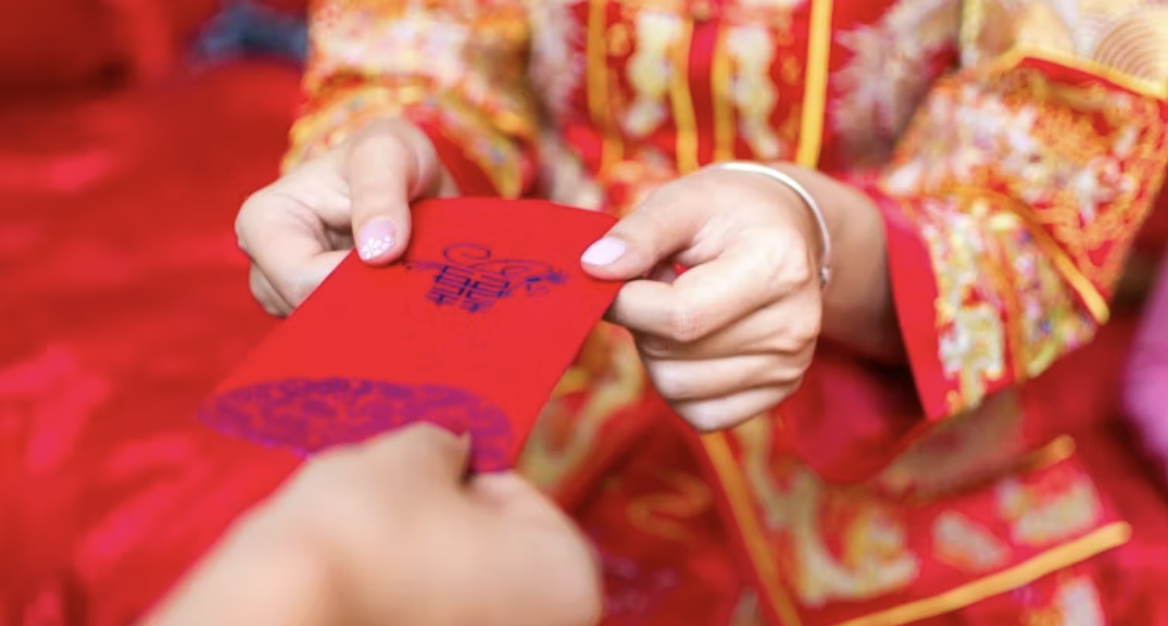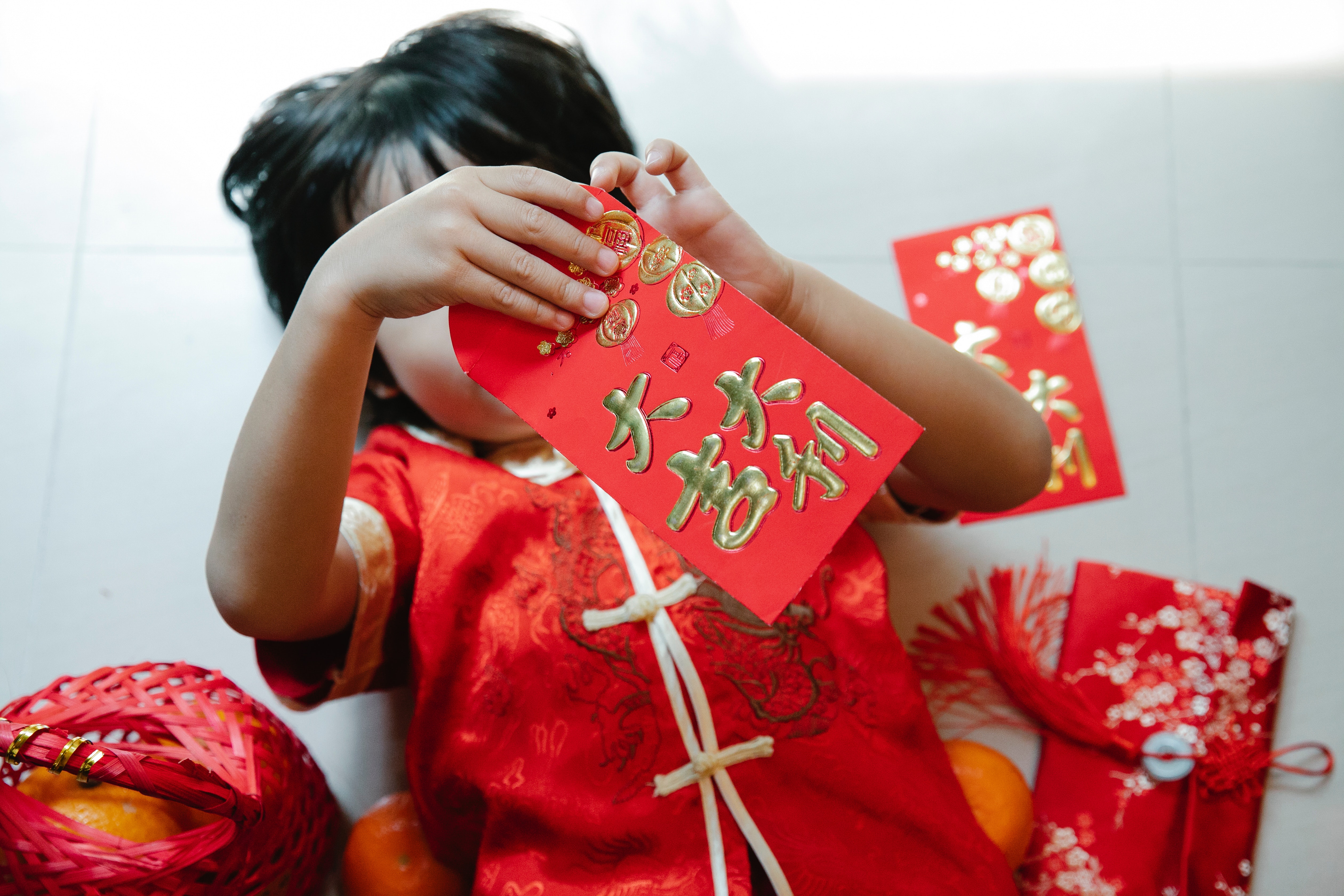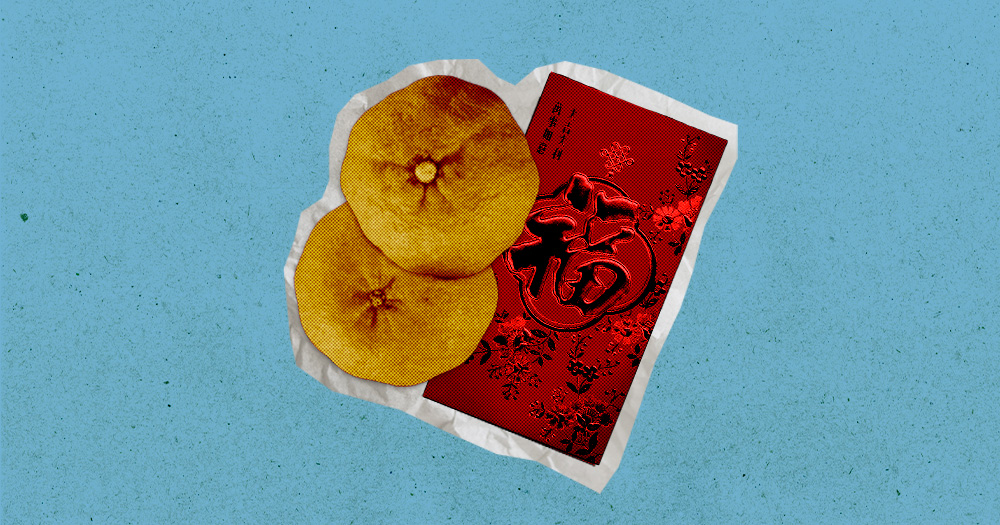Follow us on Telegram for the latest updates: https://t.me/mothershipsg
PERSPECTIVE: During CNY, angbao-giving is practiced by many families as an expression of goodwill and well-wishes for an auspicious new year.
For those from more traditional families, there are spoken and unspoken “rules” that dictate the specifics of angbao-giving.
Missing someone out might be perceived as a cold rebuff, while giving too small an amount can be seen as stingy.
What’s behind our families’ angbao traditions, and why does it seem like something so simple has hidden “politics” involved? Our writer tries to navigate this tricky landscape.
Every year, before Chinese New Year begins, my family and I will sit down together to pack the year's angbaos (red packets).
This has been an annual tradition for as long as I can remember.
After 27 years, the "assembly line" has pretty much been fine-tuned to perfection.
My dad, supervising the whole process, lets us know how much to pack and for whom, while my sister and I stuff and seal the red packets. My dad then groups and labels the different sets of red packets for their recipients.
The amounts given out are pretty standard – it largely depends on how close we are to the family of the angbao recipients; so the closer we are to them, the more we'll give.
The giving of angbao is also a time-honoured practice: us kids will present elders with mandarin oranges to "拜年" (make new year greetings), preferably including Chinese idioms related to the year's zodiac animal, before we receive our red packets.
 Image via Unsplash
Image via Unsplash
For each red packet we receive, my family will write the gifter's name on the angbao, along with who it was intended for.
This makes life a lot easier post-CNY, when we sit down as a family and count the takings together.
Each person keeps the money from their own angbaos, while our parents take note of the amounts given to us, so as to adjust the amount we give correspondingly for the following year if necessary.
I didn't use to think much about this, but now that I'm 27, and at a stage of life where I'm thinking about how I would give my own angbaos, questions arise.
Take this hypothetical scenario: After marriage, could I simply decide to just not give any angbaos. Would elder relatives see that as blatant disrespect?
Or, in a less extreme case, say I decide to give siblings different amounts of angbaos as I feel closer to some. Would anyone get offended, or even hurt that their angbao contains less than the rest?
Or let's say I gave angbaos via QR gift. Would the traditionalists in my family secretly condemn my lack of increasingly hard-to-find fresh notes?
Suffice to say,angbao giving traditions can be tricky to navigate, especially if you’re an over-thinker who cares about what other people think of you.
The politics of angbao giving
In my family, there's a simple reason we have the additional step of tracking who gives what: parity.
This doesn't affect closer relatives, as the amount of angbao money given and received usually remains fixed, explains my dad.
But for more distant relatives, the approach of tabulating and adjusting comes in handy, as there have been cases where the amount of angbao money given by some families has steadily decreased or increased over the years.
Having an estimate of how much was given the year prior is then useful so we are able to try to match the amount that was given subsequently.
To my dad, it's about making sure we give enough; in particular, when more money is given to us, we don't want to be seen as "taking advantage" of others' generosity or making our relatives "lose out".
This same rule applies to when there are new additions to the family, like when I got into a relationship. It'd be paiseh (embarassing) for my family if we did not reciprocate to my partner's family, since I received angbao from his parents.
After asking around, I found a friend whose family does the same thing — keeping meticulous records of which angbaos came from which relatives.
She agreed with my dad's justification, and shared that her mum also employs the same approach to make sure that in cases where she's intentionally given more angbao to certain relatives, they don't try to pay it back the following year.
Sounds complicated and even excessive, but it's all in the name of giving blessings in an orderly manner.
Giving more to families with less kids, or those who are more social?
There are of course, other variations.
I heard from my 30-year-old colleague that his parents take a slightly different approach, to take into account the number of kids in one’s family.
Because the family has four children, his parents “consciously pack more cash” into angbaos for children from smaller households, in order to even out the numbers as those families would be likely to receive less.
His immediate family also practices another unique tradition: While unmarried children get angbao from their parents, each of the siblings also give an angbao to their parents, as all earn incomes now.
For another 25-year-old colleague, it’s a more laidback approach, as the amount of angbaos one receives more or less boils down to how much socialising one does.
With a very big family of 80 individuals coming and going throughout the day, no one really keeps track of who is giving angbaos to who.
She explains that if the siblings talk about the amount their relatives gave, it's usually simply to check if they had both received the same number.
She adds: "If we missed one or two, we will just laugh it off and blame ourselves for not socialising enough to get noticed. Sometimes, I do realise I get one or two more, just cause I’m more talkative that day and maybe I get noticed, while my bro is munching away.”
As such, there's no pressure to keep to the amount of money given the year prior.
"It's pretty fair and no politics. Don’t want to offend anyone in the midst of celebrating."
Which sounds great, but I think if applied to my family, however, could unintentionally be offensive. Especially for the relatives who take pride in maintaining their angbao rates and numbers every year.
Giving money once one gets married
Then there's how to handle angbao-giving once one gets married.
Generally, there’s an unspoken rule that newlyweds are exempt from giving angbaos in their first year of marriage.
 Image via MarketingWeek
Image via MarketingWeek
But when you start might also be influenced by your family’s own traditions, and perhaps how much judgement you can take.
For two of my newlywed colleagues, their families do exercise the tradition where married couples begin angbao-giving from their first year, although it is not explicitly stated as an expectation.
For one newlywed, aged 25, there’s a need to maintain “face” within the family. As most other couples in her family have distributed angbaos even as newlyweds, her parents had told her to give if she could, within her means.
She adds:
“I think it [angbao giving] is a bit stressful lah tbh. It’s worse on newlyweds because you have no kids to earn back from, and you don't want people to think you're stingy.”
It's not that she does not want to give angbaos at all; angbao-giving is a tradition she appreciates as a form of blessing to her loved ones, and that's what her family was taught to keep out of respect since young.
However, for big families, giving angbaos can also get "a bit financially draining".
Thus, she intends to partially adhere to her family's traditions for her first year, with the aim being to avoid "getting scolded".
The couple will give angbaos to their parents, in-laws, and grandparents, and those of their same age or younger, but not to anybody older than them.
This may seem like only a mild deviation from tradition, but she considers it "quite daring".
She further opines: "If I could really control how to give angbaos, I'd restrict it to only the people one generation below you, both single and married. So everyone has the same obligation – give to your children/nieces/nephews, and not your cousins/grandchildren/grandnephews."
To her, giving to the younger generation seems more meaningful as it is something they will appreciate, as compared to cousins of the same age who are more than capable of earning the S$10 that is given anyway.
She adds: "If I don't give to everyone, I can also extend to giving to others like migrant workers, my husband's nurses etc. The new practice also means that you can get some cash even though you are married, which evens it out a little bit and makes it seem less like the world is pressuring you to make babies."
To completely break from tradition
For my other colleague, however, he intends to completely break from tradition, even though he does mostly agree with them.
“I'm super keen to do things differently. For starters, my wife and I are planning to give QR angbaos to save everyone the trouble of dealing with cash.”
To make giving less serious and more fun, the couple has also come up with angbao-giving games for CNY, and intend to invite their nieces and nephews to play with them.
For example, their relatives can opt for an "angbao lucky draw", and try their luck in winning anything between S$2 and S$50.
He shares:
"The intention here is to get both ourselves and the children to be a little more engaged in the process, hopefully in a fun way.
For some of the children we're giving angbaos to, this could be our only time seeing them in the whole year so we want to use this as an opportunity to connect."
 Image via Pexels
Image via Pexels
At the same time, not every child will be up for such games, so there will also be an option for kids to receive a "normal" angbao.
Through this new practice, he hopes to carry out the angbao-giving tradition in his own way.
Instead of having to think of a fixed number to give, for example, the games will help "randomise" how much the couple gives their angbao recipients.
The point is also to revamp conventions in a way that will "still be fun and meaningful", though it comes at some cost.
He shares:
"Thinking about how to do so requires more time and energy, and I don't want to make it seem like other people's practice is boring. But I just don't want to simply follow tradition."
Keeping the traditions that I agree with
As for me, I see myself potentially tapping on my parents knowledge when it's my turn to dole out packets of cash to the children of friends and relatives.
Thinking so much about angbao-giving seems antithetical to what CNY is really about (catching up with family and celebrating the new year). But I've come to see that it makes sense to do so.
Because of how I grew up, the value of the angbao-giving tradition is deeply-rooted in my family, and I do believe that being able to give angbaos in the future would be a good way to show my respect to my elders and appreciate the loved ones in my life.
Given the fixed rules for angbao-giving in my family, I'd also personally want to avoid deviating too much from tradition that I scandalise some of my relatives.
Unlike for my 25-year-old colleague, where the entire affair is a lot more laissez-faire, angbao-giving in my family definitely follows stricter norms.
There is nothing wrong with that, but it also means that as much as I don't want to overthink, I have to tread cautiously and think harder about how to navigate these norms if I do intend to deviate from my family's tradition.
For example, while there will never be a requirement from my parents and aunts to give them a specific amount, I know I do want to make sure that I am able to give them a fitting token that recognises the role they've played in bringing me up.
But I also don't want to spend beyond my means, especially when I'm just starting my own household and will have bills to pay.
Perhaps one safe way is just to begin giving amounts that end with the Chinese "lucky numbers" of S$6 and S$8.
The amounts I give them won't match what they used to give me, but I know they'd appreciate the thought behind it.
I can also adapt the "keeping track of angbao money" approach to make sure my giving increases over the years, along with my financial ability.
It's times like this that well worn clichés really do ring true: what we make of the traditions our parents pass down is really up to us.
Top image made from pictures by Mae Mu and Chuttersnap via Unsplash
If you like what you read, follow us on Facebook, Instagram, Twitter and Telegram to get the latest updates.
